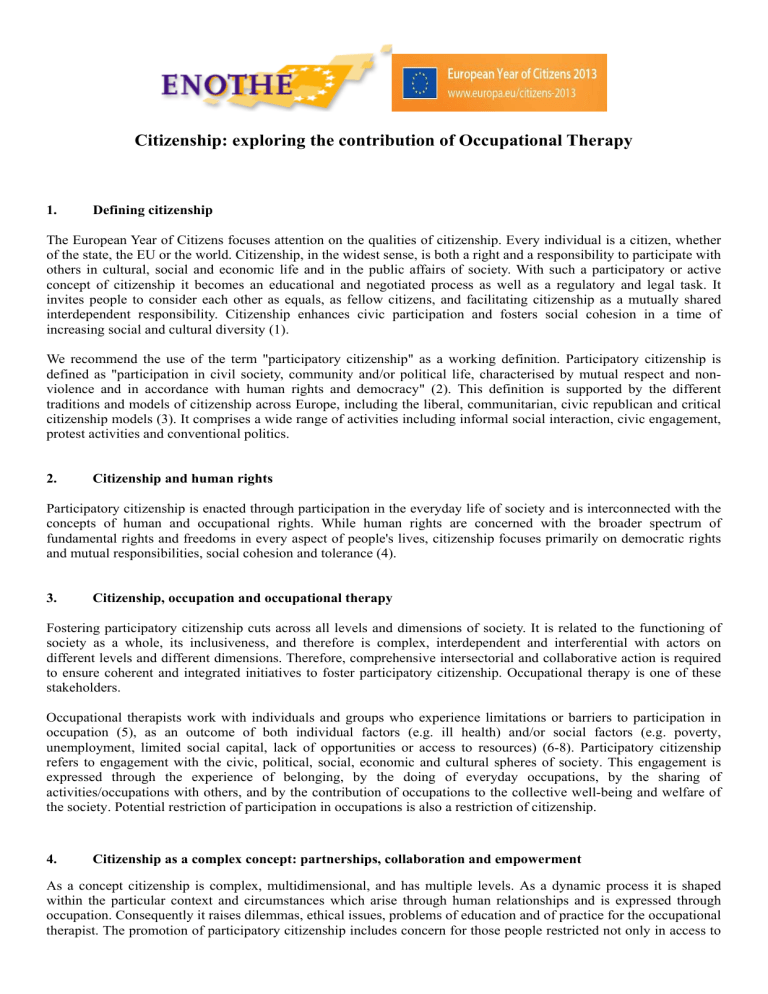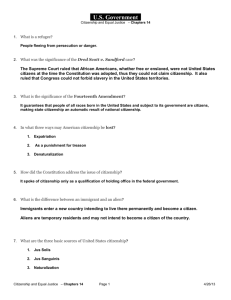Citizenship: exploring the contribution of Occupational

Citizenship: exploring the contribution of Occupational Therapy
1.
Defining citizenship
The European Year of Citizens focuses attention on the qualities of citizenship. Every individual is a citizen, whether of the state, the EU or the world. Citizenship, in the widest sense, is both a right and a responsibility to participate with others in cultural, social and economic life and in the public affairs of society. With such a participatory or active concept of citizenship it becomes an educational and negotiated process as well as a regulatory and legal task. It invites people to consider each other as equals, as fellow citizens, and facilitating citizenship as a mutually shared interdependent responsibility. Citizenship enhances civic participation and fosters social cohesion in a time of increasing social and cultural diversity (1).
We recommend the use of the term "participatory citizenship" as a working definition. Participatory citizenship is defined as "participation in civil society, community and/or political life, characterised by mutual respect and nonviolence and in accordance with human rights and democracy" (2). This definition is supported by the different traditions and models of citizenship across Europe, including the liberal, communitarian, civic republican and critical citizenship models (3). It comprises a wide range of activities including informal social interaction, civic engagement, protest activities and conventional politics.
2. Citizenship and human rights
Participatory citizenship is enacted through participation in the everyday life of society and is interconnected with the concepts of human and occupational rights. While human rights are concerned with the broader spectrum of fundamental rights and freedoms in every aspect of people's lives, citizenship focuses primarily on democratic rights and mutual responsibilities, social cohesion and tolerance (4).
3. Citizenship, occupation and occupational therapy
Fostering participatory citizenship cuts across all levels and dimensions of society. It is related to the functioning of society as a whole, its inclusiveness, and therefore is complex, interdependent and interferential with actors on different levels and different dimensions. Therefore, comprehensive intersectorial and collaborative action is required to ensure coherent and integrated initiatives to foster participatory citizenship. Occupational therapy is one of these stakeholders.
Occupational therapists work with individuals and groups who experience limitations or barriers to participation in occupation (5), as an outcome of both individual factors (e.g. ill health) and/or social factors (e.g. poverty, unemployment, limited social capital, lack of opportunities or access to resources) (6-8). Participatory citizenship refers to engagement with the civic, political, social, economic and cultural spheres of society. This engagement is expressed through the experience of belonging, by the doing of everyday occupations, by the sharing of activities/occupations with others, and by the contribution of occupations to the collective well-being and welfare of the society. Potential restriction of participation in occupations is also a restriction of citizenship.
4. Citizenship as a complex concept: partnerships, collaboration and empowerment
As a concept citizenship is complex, multidimensional, and has multiple levels. As a dynamic process it is shaped within the particular context and circumstances which arise through human relationships and is expressed through occupation. Consequently it raises dilemmas, ethical issues, problems of education and of practice for the occupational therapist. The promotion of participatory citizenship includes concern for those people restricted not only in access to
community, but also restricted to the processes of citizenship including equitable participation in discussion, decision making and conflict resolution. Key issues to consider include: a) Partnerships
The complex and multidimensional processes of citizenship involve many social actors, and need to be approached from a kaleidoscopic perspective. This calls for collaborative approaches and interdisciplinary/ transdisciplinary work (9). b) Physical, social and virtual spaces in which to practice citizenship.
Citizenship takes place through a large number of social institutions, for example those providing employment, education, and legal regulation Equity of access (accessibility) and equity of engagement in the processes of these institutions needs to be ensured.
These spaces also promote opportunities for people to share experiences of life with others, in work, leisure, play, intimacy, and creativity. These spaces are not neutral, and their role in promoting participation or not is important.
They can be places for inclusive actions where citizens strengthen their perception of belonging and change can happen. c) Participatory citizenship as a way of being in the world with others
Citizenship is expressed through occupation with others in a social context, and is challenged by inequality, discrimination and other forms of exclusion or privilege. Empowering citizenship includes: having a say and being listened to, self-power, own decision-making, having control or gaining further control, being free, independence, being capable of fighting for one’s rights, and being recognized and respected as equal citizens and human beings with a contribution to make (10-12).
Engagement with others, the recognition of and respect for difference, together with the on-going collective questioning of acceptable or not forms of occupation are essential to the process of participatory citizenship.
5. Citizenship and education
Participatory citizenship is primarily a learnt activity. Learning about citizenship is not the mere acquisition or transfer of knowledge by an individual. It is a process of social participation (13), which occurs through opportunities for the production or construction of knowledge (14). It requires that professionals and service users or clients, teachers and students, interact as citizens, with the competence to engage in dialogue, manage conflicts and cooperate, and have a commitment to active democratic participation in society. Engaging in civic society requires an understanding and acceptance of its plurality as well as the skills to engage in one’s community to address various forms of injustice (23).
Occupational therapists require the competences (15) to establish learning processes for citizenship in all contexts, and to work with others to establish effective approaches towards overcoming barriers to participatory citizenship.
6. Conclusion
The current reality of the world is far from the fulfillment of human rights and citizenship. There is a strong argument for mutual efforts, knowledge exchange, civic engagement and partnerships in order to promote social changes.
Occupation is a way to enact citizenship; through practices, participation and engagement with others. Therefore, occupational therapists primarily act as citizens themselves, able to identify and recognise their rights and capacities.
However, they are also able to develop interventions and objectives which aim to realise those rights and capacities within individuals and wider communities.
1.3.2013. Prepared for ENOTHE by the citizenship working group: Hetty Fransen (Tunisia/The Netherlands), Sarah
Kantartzis (UK/Greece), Nick Pollard (UK), Ines Viana Moldes (Spain/Brazil).
References
(1) Council of Europe (2008) White Paper on Intercultural Dialogue “Living Together As Equals in Dignity”. Available at: http://www.coe.int/t/dg4/intercultural/source/white%20paper_final_revised_en.pdf
(2) Hoskins, B. & Kerr, D. (2012) Final Study Summary and Policy Recommendations. Participatory Citizenship in the European Union. European Commission,
Europe for Citizens Programme. Available at: http://ec.europa.eu/citizenship/pdf/report_4_final_study_summary_and_policy_recommendations_.pdf
(3) Hoskins, B. et al (2012) Contextual Analysis Report. Participatory Citizenship in the European Union. Institution of Education. Available at: http://ec.europa.eu/citizenship/pdf/report_1_conextual_report.pdf
(4) Council of Europe. (2010). Council of Europe Charter on Education for Democratic Citizenship and Human Rights Education. Available at: http://www.coe.int/t/dg4/education/edc/Source/Charter/Charter_brochure_EN.pdf
(5) World Federation of Occupational Therapists (2006). Position Statement on Human Rights. Available from: www.wfot.org
(6) Bambra, C., Gibson, M., Sowden, A., Wright, K., Whitehead, M. & Petticrew, M. (2010). Tackling the wider social determinants of health and health inequalities: evidence from systematic reviews. Journal of Epidemiological Health. 64, 284-291
(7) World Health Organisation (WHO). (2008). Closing the Gap in a Generation: Health Equity Through Action on the Social Determinants of Health. Available at: http://www.who.int/social_determinants/thecommission/finalreport/en/index.html
(8) World Health Organization (2010) CBR Guidelines. Available at: http://www.who.int/disabilities/cbr/guidelines/en/index.html
(9) Van Bruggen, H., Kantartzis, S. & Rowan, S. (Eds) (2010). COPORE. Competences for Poverty Reduction. Amsterdam: ENOTHE
(10) European Commission (2010) EUROPE 2020. A strategy for smart, sustainable and inclusive growth. Available at: http://ec.europa.eu/eu2020/pdf/COMPLET%20EN%20BARROSO%20%20%20007%20-%20Europe%202020%20-%20EN%20version.pdf
(11) World Health Organisation (2012) World report on disability. Available at: http://whqlibdoc.who.int/publications/2011/9789240685215_eng.pdf
(12) World Federation of Occupational Therapists (2009) Guiding Principles on Diversity and Culture. Available from: www.wfot.org
(13) Rami, J., Lalor, J., Berg, W., Lorencovicova, E., Lorencovic, J., Onate, C. & Elm, A. (2006). Competencies for educators in Citizenship Education & the
Development of Identity in First & Second Cycle Programmes: Volume 1. CiCe Erasmus Academic Network. Available at: http://cice.londonmet.ac.uk/
(14) Freire, P. (1996). Pedagogia da Autonomia - Saberes Necessários à Prática Educativa São Paulo: Ed. Paz e Terra.
(15) The Tuning Occupational Therapy Project Group (2008). Tuning Educational Structures in Europe. Reference Points for the Design and Delivery Degree
Programmes in Occupational Therapy . Bilbao. Publicaciones de la Universidad de Deusto.
Further readings
Bambra, C., Gibson, M., Sowden, A., Wright, K., Whitehead, M. & Petticrew, M. (2010).
Tackling the wider social determinants of health and health inequalities: evidence from systematic reviews. Journal of Epidemiological Health.
64, 284-291
Cappelle, G., Crippin, G. & Lundgren, U. (2011). World Citizenship Education and Teacher Training in a Global Context. CiCe Erasmus Academic Network.
Available from: http://cice.londonmet.ac.uk
Dias Barros D, Garcês Ghirardi MI and Esquerdo Lopes R (2006) Social occupational therapy: a social-historical perspective. In: Kronenberg F, Simó S, Pollard
N. Occupational Therapy without borders. Learning from the spirit of survivors (pgs. 140-151). Edinburgh: Churchill Livingstone.
Francisco B (1988) Terapia Ocupacional . 1ªed. Sao Paulo: Papirus.
Freire, P. (1972) The pedagogy of the oppressed. Harmondsworth; Penguin
Galheigo, SM (2011) What needs to be done? Occupational therapy responsibilities and challenges regarding human rights. Australian Occupational Therapy
Journal, 58 , 60–66.
Kronenberg F, Simó-Algado S, Pollard N. (2005). Occupational Therapy without borders. Learning from the spirit of survivors. Edinburgh: Churchill Livingstone/
Elsevier .
Kronenberg F, Pollard N, Sakellarioiu D. (2011). Occupational Therapy without borders II: towards an ecology of occupation-based practices. Edinburgh ; New
York : Churchill Livingstone/Elsevier.
Oliver F, Nicacio F (2007) Autonomía, derechos y participacións social: directrices para la atención y rehabilitación psicosocial de base comunitaria/territorial. In
Paganizzi L. et al, Terapia Ocupacional Psicosocial: Escenarios clínicos y comunitarios , (págs. 121-138). Buenos Aires: Polemos.
Pollard N., Sakellarioiu D., Kronenberg F. (2008). A political practice of occupational therapy. Edinburgh: Churchill Livingstone/ Elsevier .
Rocha-Medeiros MH (2008) Terapia Ocupacional: un enfoque epistemológico y social.
Santa Fé, Argentina: Universidad Nacional del Litoral.
United Nations. (2012). The Millenium Development Goals Report. Available from: http://www.un.org/millenniumgoals/pdf/MDG%20Report%202012.pdf








